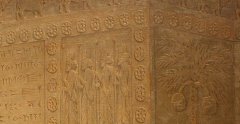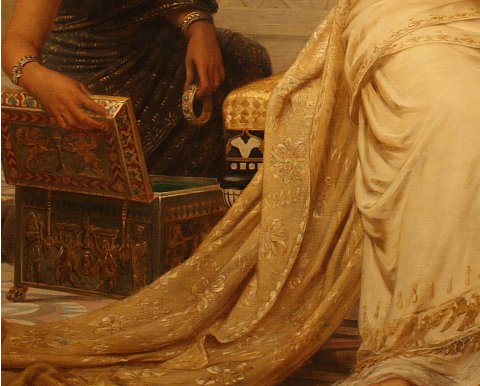1) Providence and Purim

The feast of Purim, is one of joy for deliverance in events that unfolded due to God-guided Providence in a time of exile with no open vision. The feast is not put in place by God. The name of God is not in the book. Each event seems natural, but the outcome favours the Jews when their enemies arise. It is not the redemption pattern, but a pattern by which we might judge events until Messiah comes.
The book of Esther begins with an empire wide celebration with no Jews in sight. It is a record of a festival of the power of the Gentiles at their typical best: enforcing power by showing their wealth and granting favour. Truly, as it is observed,
The kings of the Gentiles exercise lordship over them; and they that exercise authority upon them are called benefactors. (Luke 22:25)
After impressing the conquered, the feast extends to the palace for another seven days. It seems natural that while drunk the king wishes to show his wife. For Vashti (who is perhaps not unlike a modern woman) and possibly not sober herself, nothing is more natural than that she refuses to come. The anger, the removal of Vashti from being a wife and the resulting law is totally within character. There is no doubt that reactionary lawmaking comes easily to those who hold power. Nothing is more natural that when the king sobers, he re-thinks the situation. His advisers have a solution: 'find a fair young virgin.'
As we know with hindsight that Hadassah (Esther), who is introduced at this point, is raised up, the events of the drinking, calling of Vashti, the refusal and anger which seemed natural were all engineered. Just how much does Yahweh Elohim control? Does he influence a leader's mood, if need be? It might well be so. It is said in Proverbs
The king's heart is in the hand of the LORD, as the rivers of water: he turns it wheresoever he will. (Pro 21:1)

Also as Ahasuerus is a ruler he might be given special attention. Daniel is shown that no less than an archangel struggled with he Pince of Persia to shape the events (Daniel 10:13), the watchers also stated that most High rules in the kingdom of men, and gives it to whosoever he will (Dan. 4:17). All these instances indicate those in high places might be more moved that others by the angelic watchers.
Before this situation was set up beginning the narrative, some ground work was prepared. Mordecai from Kish an Benjamite, adopts a beautiful daughter, and Mordecai obtains a position in the Palace. Mordecai was in the right position to advance a beautiful female, when the call goes out.

In a situation akin to Joseph in Potipher's house, Esther is given favour. Hegai, did not know why, but he favoured Esther and gave her the best place. Time is not an issue to God, as it is a full twelve months that Ester is prepared for her future role. For some reason also Esther obtains favour from the king. It was not that her competition was not good looking, Esther has an advantage. Somehow the Elohim can give favour, a positive mood and a sense of 'rightness', and it possibly would work best on those who are not servants of God, on those who go with feeling over reason. It would work well on a king who acts with his emotions, such as Ahasuerus does consistently in the account of Esther.
All the hidden elements prepared ahead for the deliverance are set up when Mordecai of the tribe of Benjamin (from Kish and so related to King Saul) is instrumental in quashing a planned assassination attempt. After that rebellion king Ahasuerus raised to power an Agagite.
Agag was the king of Amalek that Samuel slew, because Saul the son of Kish had failed to kill him at God's command. Again we wonder at events, as Jews know that Yahweh Elohim had declared,
And the LORD said unto Moses, Write this for a memorial in a book, and rehearse it in the ears of Joshua: for I will utterly put out the remembrance of Amalek from under heaven. And Moses built an altar, and called the name of it Yahwehnissi: For he said, Because the LORD has sworn that the LORD will have war with Amalek from generation to generation. (Exodus 17:14-16)
For more about the relationship of Amakel to Purim see Link A new Amalek.
Due to the order of events it seems that Haman the Agagite was raised to power by Yahweh Elohim working in the events, for a specific reason. This is articulated,
For I was envious at the foolish, when I saw the prosperity of the wicked. .. They are not in trouble as other men.. Therefore pride compasses them about as a chain; violence covers them as a garment....They are corrupt, and speak wickedly concerning oppression: they speak loftily. They set their mouth against the heavens,... And they say, How doth God know? and is there knowledge in the most High? Behold, these are the ungodly, who prosper in the world; they increase in riches.
... Until I went into the sanctuary of God; then understood I their end. Surely thou didst set them in slippery places: thou cast them down into destruction. How are they brought into desolation, as in a moment! they are utterly consumed with terrors. (Psalm 73:3-20)
Haman the Agagite is given the prosperity he craves and a position to exercise his pride, but with the eye of hindsight, he is merely elevated into a very slippery place.
The events unfold as Yahweh would have known they would. Haman once elevated indeed became proud and very jealous of his self consequence. It seems that Mordecai in his role in the palace had not upset anyone for his refusal to bow, but even though Mordecai was no great one and clearly a minority not worthy of Haman's notice, Haman was offended. The record says he was full of wrath, it consumed him, and it resulted in a cunning and determined genocide,
And when Haman saw that Mordecai bowed not, nor did him reverence, then was Haman full of wrath. And he thought scorn to lay hands on Mordecai alone; for they had showed him the people of Mordecai: wherefore Haman sought to destroy all the Jews that were throughout the whole kingdom of Ahasuerus, even the people of Mordecai. (Esther 3:5-6).
If Yahweh had declared war with Amalek from generation to generation, the enmity was mutual. As soon as Haman knew Mordecai was a Jew, and the lack of reverence to himself was a matter of Mordecai's service to Yahweh Elohim, Haman determined to destroy all the servants of Yahweh Elohim. The implication is that Haman was already the Jew's enemy before the incident with Mordecai. This incident was the trigger for long considered action. In such a way human consequence and pride convinces those who value it, that it is reasonable to attack the servants of Yahweh, despite all evidence of the power that is with them. In the same way despite the miracles in Israel's exodus from Egypt Amalek sought to destroy Israel, before they came into the land.
But Haman in his pride ignores all evidence. He did not consider that there was a connection that was not hidden between Mordecai and the queen Esther. Mordecai had given the news of the assassination attempt on Ahasuerus through Esther. Even if he did not remember, if he read the chronicles, he would have known of it.

Haman uses two devices of human thinking to influence Ahasuerus. The first is an appeal to Ahasuerus' pride in his self-made laws, the second was a monetary profit to the king in a curious deal.
“There is a certain people scattered abroad and dispersed among the people in all the provinces of thy kingdom; and their laws are diverse from all people; neither keep they the king's laws: therefore it is not for the king's profit to suffer them. If it please the king, let it be written that they may be destroyed: and I will pay ten thousand talents of silver to the hands of those that have the charge of the business, to bring it into the king's treasuries.” (Esther 3:8-9)
This is an example of human cunning. The decree given reveals that the “it” is the spoil of Jews. For ten thousand talents, Ahasuerus is to get the wealth of all the Jews. It may be that as usual their industry had lead to some measure of prosperity in the realm, enough for Haman to have noticed it and enough to pay back Ahasuerus' expenditure. Haman wasn't using his own wealth, but the king's wealth. Haman himself was prosperous as a foreigner and had risen in power, but possibly was not a hard worker.
The quality of Mordecai is evident that when the letter for destruction goes out, instead of hiding his Jewishness, he puts on sackcloth and mourns in front of the king's gate in a clear identification with the possible victims. Esther is nervous and wishes to stop him, but Mordecai points out she is in danger too. Her identity can't be that hidden, and someone would ask. In addition Mordecai is given the role of explaining the whole motif of God's action in the events,
Then Mordecai commanded to answer Esther, “Think not with thyself that thou shall escape in the king's house, more than all the Jews. For if thou altogether hold thy peace at this time, then shall there enlargement and deliverance arise to the Jews from another place; but thou and thy father's house shall be destroyed: and who knows whether thou art come to the kingdom for such a time as this?” (Esther 4:13-14)
In the past (as all Israel knew), another son of Kish of Benjamin, Saul, for not taking his role had his house destroyed and deliverance came to Israel through David's family from Judah.
Mordecai and Esther knew she had to break the king's law. But in doing so she is given favour. In such a way even though all things were against success, providentially, success is given to Esther. Also wisdom is given to Esther, as she holds her peace and invites the king and Haman to a second banquet, before revealing her request.
Haman in his pride, ends up speaking with an ironic and sublime ignorance,
And Haman told them of the glory of his riches, and the multitude of his children, and all the things wherein the king had promoted him, and how he had advanced him above the princes and servants of the king. Haman said moreover, Yea, Esther the queen did let no man come in with the king unto the banquet that she had prepared but myself; and to morrow am I invited unto her also with the king. Yet all this avails me nothing, so long as I see Mordecai the Jew sitting at the king's gate. (Esther 5:11-13)
It is possible that with enquiry, Haman might have found that Esther was a Jew. If so he might have bewailed that Esther the Jew, Mordecai's adopted daughter was so promoted. But this fact was hidden from Haman. Esther was hidden from Haman as the psalmist said,
Let the lying lips be put to silence; which speak grievous things proudly and contemptuously against the righteous. Oh how great is thy goodness, which thou hast laid up for them that fear thee; which thou hast wrought for them that trust in thee before the sons of men! Thou shall hide them in the secret of thy presence from the pride of man: thou shall keep them secretly in a pavilion from the strife of tongues. (Psalm 31:18-20)
Also it seems to those who are proud certain things are hidden from them,
They have not known nor understood: for he [the LORD] has shut their eyes, that they cannot see; and their hearts, that they cannot understand. (Isaiah 44:18)
Again we might ponder just how much knowledge of Yahweh Elohim has to do with what we understand about the events in the world about us. Haman is shown walking in ignorance.
Then at a crucial point in events Ahasuerus can't sleep. This we know for sure was God working. What is said about God and sleep is remarkable. The LORD God caused a deep sleep to fall upon Adam (Gen. 2:21), upon Abram (Gen 15:12), upon Saul and Abner (1Sa 26:12), horses (76:6) and gives sleep to his beloved (Psa 127:2). Daniel records King Nebuchadnezzar after dreaming could not sleep afterwards (Dan 2:1) and king Saul was given a troubled spirit (! Sam 16:14).
Ahasuereus would do anything to make the time pass, as sleep was gone, and perhaps also he thought someone reading to him might help. At that critical time a fact was brought to his attention and a thought that was hidden to Ahasuerus was revealed. He realised he had not honoured Mordecai.
Unlike Haman, Ahasuerus is clearly not fixated on Jews, or had not identified Mordecai as such. Clearly he did not think of the irony that he wanted to honour a Jew, who was shortly to be killed by his own order.
Haman's own pride sets the beginning of his downfall, and begins Mordecai's rise to power. Instead of seeking to find who was to be honoured by the king, Haman assumed in his pride it was himself. Again it is lack of knowledge and a lack of seeking for information that brings Haman's downfall.
The wicked in his pride does persecute the poor: let them be taken in the devices that they have imagined. (Psalm 10:2)
For the sin of their mouth and the words of their lips let them even be taken in their pride: (Psalm 59:12)
When pride cometh, then cometh shame: but with the lowly is wisdom. (Pro 11:2)
Pride goes before destruction, and an haughty spirit before a fall. (Pro 16:18)
Haman's embarrassment at the outcome when Mordecai is honoured seems natural, but the favour of events where Yahweh Elohim has power, leads to this event. Ironically, it is Haman who takes away Mordecai's sackcloth. The giving of clothing is what Esther had desired, but Mordecai had refused previously. He could not refuse it from the now embarrassed Haman, by order of the king.
Then we find out that Haman and his entourage knew all along that there was something about Jews,
And Haman told Zeresh his wife and all his friends every thing that had befallen him. Then said his wise men and Zeresh his wife unto him, 'If Mordecai be of the seed of the Jews, before whom thou hast begun to fall, thou shall not prevail against him, but shall surely fall before him.' (Esther 6:13)
They knew very well, more so than the king who seems to not have a feeling about Jews, that with Jews there was the Power of a Living God. Haman had been presumptuous in his pride at all levels, as he had sought knowingly (as Amalek had) to go against the people of the living God.

The king is brought by events to a position where he is happy to hang Haman his former favourite on the gallows Haman had himself prepared for Mordecai. In this we see the long outworking of the favour Esther had obtained with Ahasuerus. This seems likely to have been a favour, that grew initially from the feeling given to her by a mood at the beginning. Mordecai began to be raised in power due to his loyalty to Ahasuerus, but his rise was completed by being the favoured queen's uncle. In this way Yahweh Elohim prevailed over a man who hated the Jews.
The events recorded in Esther may be seen as Yahweh Elohim's war on the seed of Amalek. The anti-Jewish feeling of Haman and his cohorts was known to Yahweh, and possibly known to others, as he is known as the 'Jew's enemy.' This is when Yahweh goes to work. First the events are set at a party, where pride on the part of both king and queen is used to bring the fall of Vashti. Esther is given favour. Then some time passes. Mordecai is given to be in the right place and time to find inside information that is useful to the king. Then Haman the Agagite is raised so he may be destroyed by his own pride, to the glory of the God of the Jews.
In all this God is not mentioned. Yet in every instance it may be seen by those who know the power of Yahweh Elohim from elsewhere in the scriptures, that he is working in every instance with the people involved at every level, for an outcome for his glory. The providence is amazing as there is no doubt that the outcome of events required as essential parts Mordecai and Hadassah's faith and Haman's pride.
See also




